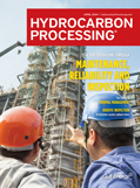Natural Gas
Executive Viewpoint: It was the best of times
“It was the best of times, it was the worst of times, it was the age of wisdom, it was the age of foolishness…”. Fortunately, this opening line from A Tale of Two Cities does not often present itself as an appropriate analogy to the oil and gas industry. Yet, here we are.
Improved measurement of water content in natural gas
Consumers likely imagine natural gas as a stream of pure methane. Those who are closer to the energy industry know that methane is the major component, but there can easily be dozens of other substances making up a sizeable portion of the total volume.
Business Trends: The economics of reliability—An interim report on the global refining industry
What is reliability? Most people think reliability is simply a measure of failure, or lack of failure. If something runs for a longer period without failing, then it is more reliable than something that runs for less time. However, reliability is a measure of how often something performs when you want it to.
Industry Perspectives: Will capital investments increase in 2021 and beyond?
Over the past several years, the world witnessed a significant increase in downstream capacity growth in all sectors of the hydrocarbon processing industry (HPI). However, the COVID-19 pandemic caused a significant decline in demand for transportation fuels and certain petrochemical value chains.
Editorial Comment: Maintenance and reliability—A cornerstone of safe and efficient plant operation
Refineries and petrochemical plants are comprised of a series of crucial processes to produce transportation fuels, products and chemicals demanded by the global market. These processes consist of capital-intensive units that must be maintained to provide reliable performance. Failure to adequately maintain these assets can have a detrimental effect to not only operations and profit, but also to worker safety.
Executive Viewpoint: Technology to drive decarbonization of the oil and gas industry
<i>Hydrocarbon Processing</i> (HP) was pleased to speak with Thorbjoern Fors (TF), EVP of Industrial Applications, Siemens Energy, to discuss the decarbonization of the oil and gas industry and the technologies that are helping companies meet their sustainability goals.
Design considerations when flaring ethylene oxide
The flaring of gases released from normal process vents and safety valve discharges following an overpressure scenario is widely practiced in refineries, petrochemical and chemical plants.
Industry Metrics
U.S. refinery margins extended their upward trend for the fifth consecutive month, exhibiting the largest upturn relative to other regions.
Best practices for pygas-based styrene extraction
Pyrolysis gasoline (pygas) is a by-produced fraction of hydrocarbons generated from a steam cracker.
Specifying internals in sour water strippers—Part 1
A sour water stripper (SWS) system is a common process in petroleum refineries and other processes where hydrogen sulfide is present.

- Pakistan-China to sign MoU on oil-to-chemicals complex in June 5/17
- China biofuel makers bet on sustainable aviation fuel 5/17
- AMETEK Land provides thermal imagers to large ethylene producer 5/17
- China's refinery output falls for first time in 20 mos due to maintenance 5/17
- Dow, SCG Chemicals sign MoU to transform 200,000 tpy of plastic waste into circular products 5/17
- Ukraine long-range attacks continue to disrupt Russian refining, energy operations 5/17




